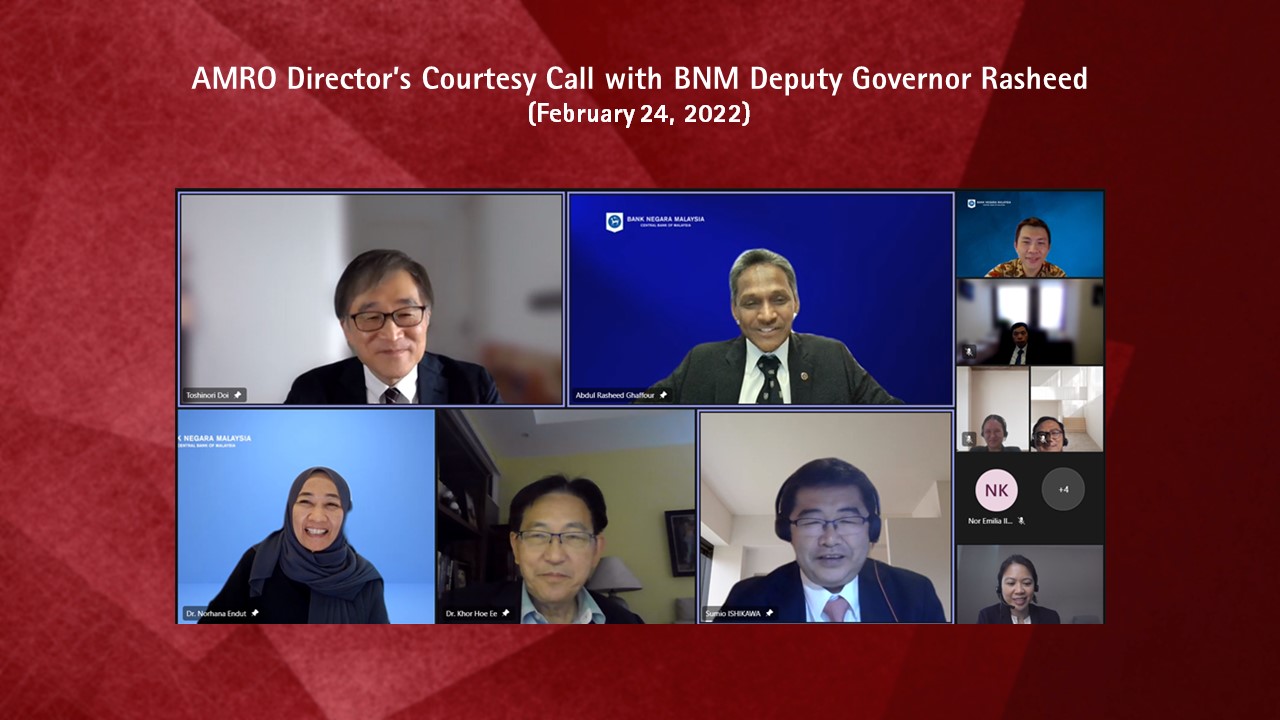
SINGAPORE, February 25, 2022 – The Malaysian economy is expected to grow strongly in 2022; regaining momentum after the Delta strain of COVID-19 infections disrupted recovery in Q3 2021.
While the country is currently experiencing a resurgence of infection by the Omicron variant, symptoms are much milder, thanks in large part to the high, almost 80 percent vaccination rate of the population. The continuing inoculation program and adequate healthcare capacity should keep the economy relatively open to allow for a sustained rebound in domestic demand. Accordingly, policies should be recalibrated to support a robust and sustainable recovery.
These conclusions form the preliminary assessment by the ASEAN+3 Macroeconomic Research Office (AMRO), after its virtual Annual Consultation with the Malaysian authorities in January and February 2022.
The AMRO team was led by Lead Economist, Dr. Sumio Ishikawa. AMRO Director, Mr. Toshinori Doi, and Chief Economist, Dr. Hoe Ee Khor, participated in the policy meetings. The discussions focused on Malaysia’s recent economic developments and risks to recovery, continuing policy support in response to pandemic disruptions, and policy considerations as the economy transitions to an endemic COVID-19 phase.
Economic developments and outlook
“We expect the Malaysian economy to grow by 6.0 percent in 2022 from 3.1 percent in 2021,” says Dr. Ishikawa. “This year’s growth will be driven by a sustained rebound in domestic demand, as economic and social activities continue to recover despite the Omicron wave. At the same time, Malaysia’s exports should remain supported by buoyant global demand, as well as increased production capacity,” adds Dr. Ishikawa.
Malaysia is set to build on the recovery momentum that resumed toward the end of 2021 as mobility restrictions were lifted. In the final quarter of 2021, the economy expanded by 3.6 percent relative to the previous year. The expansion took hold despite the floods that hit several parts of the country in December. Latest indicators suggest that manufacturing output and private consumption continued to grow in the first 1-2 months of 2022.
Policy responses
Due to the weaker recovery in 2021, Malaysian authorities have decided to pursue a more gradual pace of fiscal consolidation to support the economy.
The 2022 Budget will remain sizeable, amounting to MYR332 billion (20.3 percent of GDP), and the fiscal deficit will stay elevated at 6 percent of GDP compared to the 2016-19 average of 3.3 percent. Targeted cash assistance, wage subsidies, and job hiring incentive schemes will remain available to vulnerable groups.
Development expenditure will also be ramped up in 2022, primarily to enhance public transportation, support digital connectivity, improve healthcare facilities, and equip the workforce with new skills, in line with the country’s medium-term aspirations under the 12th Malaysia Plan.
To make room for the pandemic-related stimulus, the statutory debt ceiling has been raised to 65 percent of GDP from 60 percent in 2020 and 55 percent prior to the pandemic.
Monetary policy has also remained accommodative. The policy rate has been maintained at a record low of 1.75 percent since September 2020. Low interest rates have supported credit growth and corporate bond issuance. Other forms of financial support—such as the loan repayment assistance and pre-retirement withdrawal schemes—will be scaled down in 2022 as the economy recovers.
Risks and vulnerabilities
The emergence of more virulent vaccine-resistant COVID-19 variants remains a major threat to economic recovery; although a tail risk.
The spike in global inflation also risks disrupting the strong external demand, as advanced economies pursue more aggressive monetary tightening that could lead to weaker growth.
Higher borrowing costs could likewise hold back the rebound in Malaysia’s domestic demand as households and firms prioritize debt servicing over spending and investment. In this risk event, fiscal policy will be left with limited space to further support the economy, given the already sizeable debt burden.
Policy recommendations
While supportive fiscal policy remains critical to narrow the disparity across sectors, a faster pace of fiscal consolidation over the medium term is warranted to ensure fiscal sustainability. In particular, revenue can be boosted by broadening the sales and services tax first, before eventually transitioning to the value-added tax, as the recovery becomes entrenched, perhaps starting in 2023.
Monetary policy has scope to normalize in 2022 while remaining accommodative, because the policy rate should remain negative in real terms under a gradual pace of rate increases. AMRO staff welcome the shift from a comprehensive to a targeted loan repayment assistance scheme that has been progressively instituted in tandem with the resumption of economic activities in 2020. Loan impairments could emerge as a result, but the banks should be able to withstand higher credit risks with their ample buffers and pre-emptive provisioning.
Authorities have been proactive in facilitating foreign direct investments during the pandemic and advancing initiatives to mitigate climate change. Building on the gains from these initiatives would propel the economy to a progressively sustainable path.
The AMRO team would like to thank the Malaysian authorities and other meeting counterparts for their cooperation and valuable insights during the mission. This year’s consultation was conducted virtually due to the ongoing pandemic. AMRO wishes to express its appreciation to the authorities for their support and coordination in making the consultation possible.

Top Row (from L to R): AMRO Director Mr. Toshinori Doi, MOF Undersecretary Mr. Abu Bakar Salleh Jambol, AMRO Chief Economist Dr. Hoe Ee Khor, AMRO Malaysia Mission Chief Dr. Sumio Ishikawa
With participation from the AMRO Malaysia team and MOF colleagues

Top Row (from L to R): AMRO Director Mr. Toshinori Doi, BNM Assistant Governor Dr. Norhana Endut, AMRO Chief Economist Dr. Hoe Ee Khor
With participation from the AMRO Malaysia team and BNM colleagues

Top Row (from L to R): AMRO Director Mr. Toshinori Doi, BNM Deputy Governor Datuk Shaik Abdul Rasheed bin Abdul Ghaffour, BNM Assistant Governor Dr. Norhana Endut, AMRO Malaysia Mission Chief Dr. Sumio Ishikawa
With participation from the AMRO and BNM colleagues
About AMRO
The ASEAN+3 Macroeconomic Research Office (AMRO) is an international organization established to contribute towards securing the macroeconomic and financial stability of the ASEAN+3 region, which comprises 10 members of the Association of Southeast Asian Nations (ASEAN) and China; Hong Kong, China; Japan; and Korea. AMRO’s mandate is to conduct macroeconomic surveillance, support the implementation of the regional financial arrangement, the Chiang Mai Initiative Multilateralisation (CMIM) Agreement, and provide technical assistance to members.
